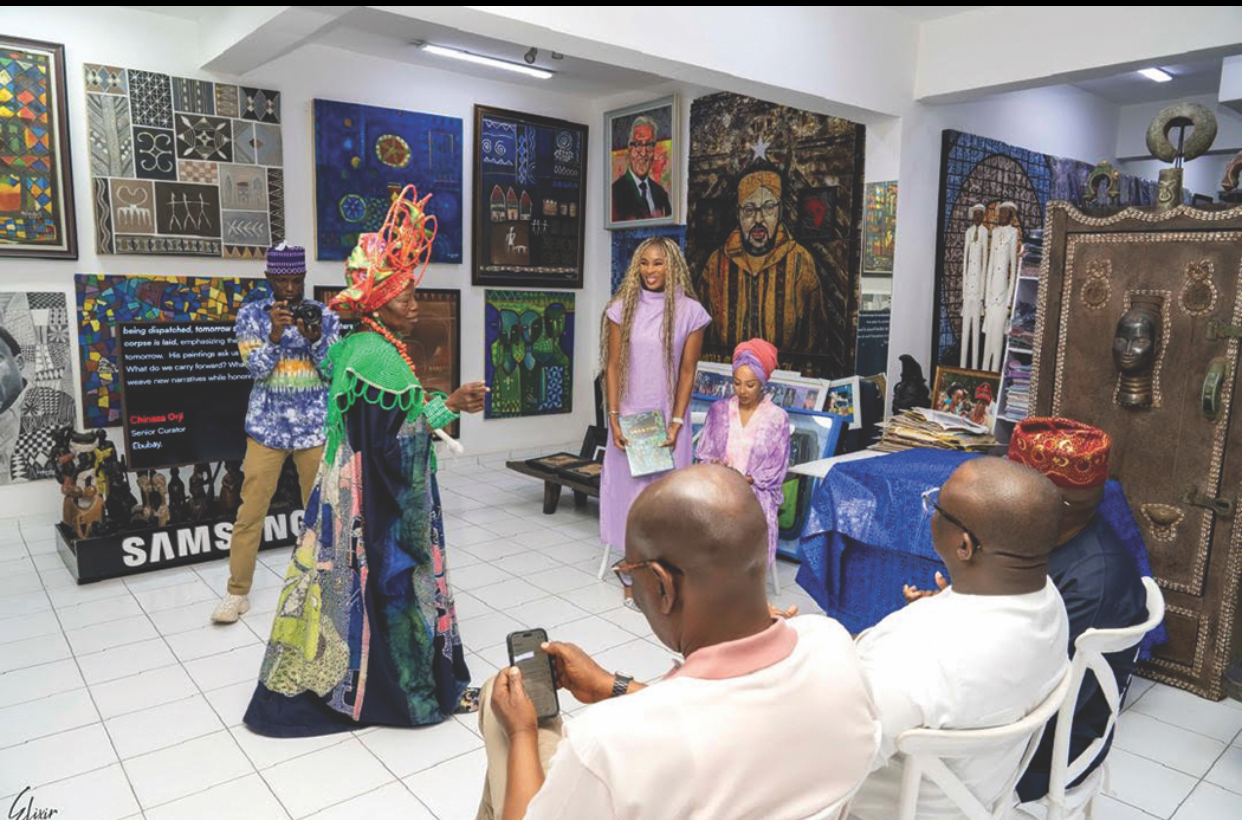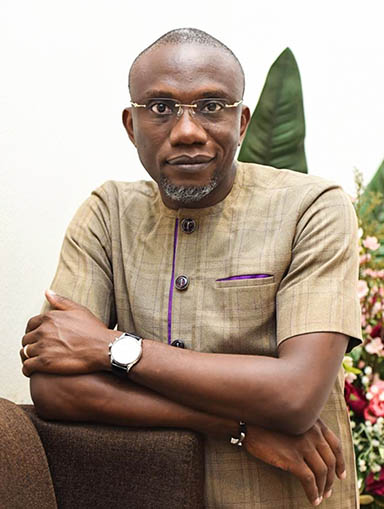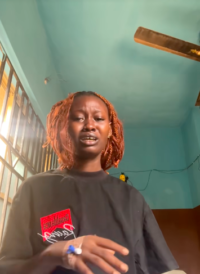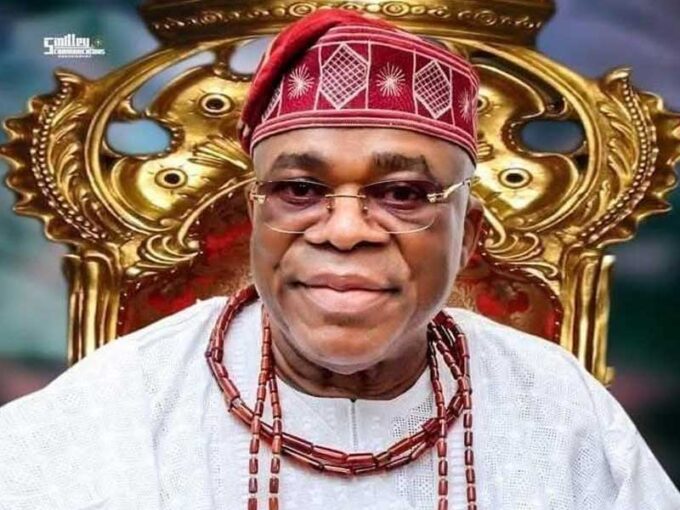What looked like a serendipitous encounter between art curator and artist Tola Wewe sparked a creative partnership that ultimately blossomed into a recently-launched coffee-table book on Wewe’s remarkable oeuvre. Okechukwu Uwaezuoke writes
I
t began less like happenstance. It was rather more like a scene scripted and staged by fate’s puckish hand. On a consulting gig, Chinaza Orji—equipped with little more than a dilettante’s curiosity about contemporary art—found herself face to face with the artist Tola Wewe. At the time, Wewe wore the slightly incongruous garb of a politician: Commissioner for Culture and Tourism in Ondo State, his Afro flecked with grey and his beard rather scanty. When he proclaimed himself, quite plainly, to be an artist, Orji took it as political small talk—the sort of résumé garnish that makes public figures seem more palatable.
But Wewe wasn’t posturing. She would soon learn that he was a lodestar in the contemporary Nigerian art constellation. With a fine arts degree from the University of Ife and a Master’s in African visual arts from the University of Ibadan, his journey had started as a cartoonist and teacher before his studio practice, in the early 1990s, claimed him fully.
Fast-forward a little to Lagos. The scene: Nike Art Centre, that Cathedral-like bazaar for art and craft along the Lekki Expressway where canvases and sculptures of all sizes and mediums jostle for wall space and tourists for selfies. There, Orji witnessed the peculiar magnetism of Wewe’s paintings. Crowds didn’t just stop; they leaned in, tilting ever so slightly forward, as if pulled by invisible strings. It wasn’t just reverence, but something close to a secular genuflection. Nigerians and foreigners alike lingered as though the canvases radiated an aura.
In that charged space, Orji’s role shifted from spectator to participant. When Wewe casually asked her to help with a few interested buyers, she obliged, assuming it a polite distraction. Instead, it marked the opening act of a quietly enduring alliance built on two old-fashioned, endengered pairing: trust and integrity. “Over time,” she recalls, “his appreciation for my work ethic and integrity opened the door to a professional relationship.”
That relationship deepened into a lifelong interest in Wewe’s journey, culminating in Threads of Time—a coffee-table book unveiled at Nike Art Centre on Sunday, August 17. Elegant yet substantial, its pages serve as both archive and celebration, a scholarly treasure trove and collector’s prize, anchored by a striking back cover that pays homage to one of Nigeria’s most celebrated contemporary artists.
Wewe’s sprawling canvases thrum with Yoruba cosmology, yet their reach is universal. His motifs, both rooted and borderless, captivate before their stories are even understood. And the man himself is no less compelling: equal parts politician, cultural custodian, and artist with an unmistakably African soul. His process—often nocturnal, trance-like—has become legend, earning him the moniker iwin, after the forest-dwelling spirit beings. From sexuality to spirituality, politics to memory, his works boldly engage themes that have earned him exhibitions across Europe, the U.S., and Africa.
For Orji, Wewe isn’t just the artist who nudged her from casual interest into a career. He was the artist who transformed her curiosity into vocation, the reason she first tasted the thrill of passing culture from one collector’s hand to another. His canvases ignited the spark, while the man—straightforward, humane, disarmingly sincere—proved rarer than most of the treasures he painted.
So, when a coterie of Lagos’s art community members gathered that Sunday afternoon—artists, collectors, cultural doyens—they weren’t simply attending a launch. They were bearing witness. Drummers called up ancient rhythms, dancers moved like embodied folklore, and in their midst lay Threads of Time: less a book than a vessel securing memory against the erasures of time.
Indeed, the project for the female curator and writer was never about glossy pages or coffee-table bragging rights. It was about permanence. Too many African masters have slipped into oblivion, their names scattered across brittle catalogues, yellowing press clippings, or oral recollections fading like smoke. “Picasso didn’t survive only because of Cubism,” she argues. “He survived because Cubism was recorded. Why should African artists be left with footnotes when they deserve chapters?”
Her answer lies in Threads of Time. Within its covers, 137 of Wewe’s works trace his evolution from figurative storyteller to abstract conjurer, always rooted in Yoruba cosmology yet conversant in a global vernacular. Orji’s task wasn’t to interpret but to preserve—custodian rather than critic, guardian of vision rather than narrator.
And if the book is an archive, it is also a manifesto. Through her platform, Ebubay, she is erecting scaffolds of memory—documenting African artists while they are alive to shape their own stories, and ensuring the world encounters them on their own terms. “African artists don’t need to ask for a seat at the table,” she says. “They can build their own—sturdy, enduring, impossible to ignore.”
The launch underscored this mission. With cultural performances, tributes from figures like Professor Ebun Clark and Femi Bakare, and the presence of leading artists including Rom Isichei, Edosa Oguigo, Sam Ebohon, and Norbert Okpu, it became more than a ceremony. It was an affirmation: that Chief Tola Wewe’s legacy is secure, that Africa’s artistic memory will not slip away, and that once woven, the threads of time will hold
















Leave a comment